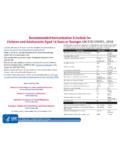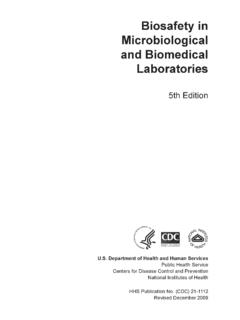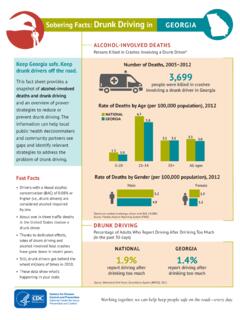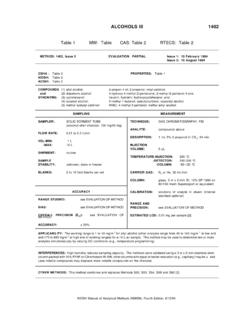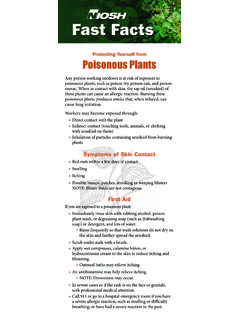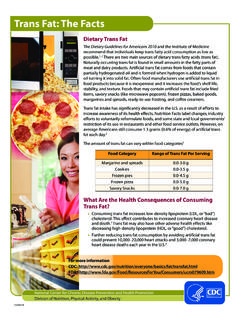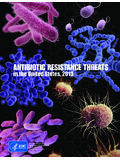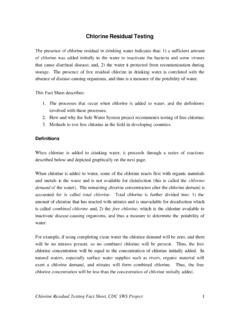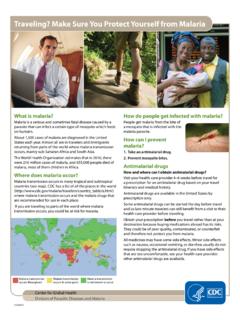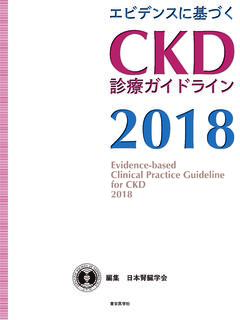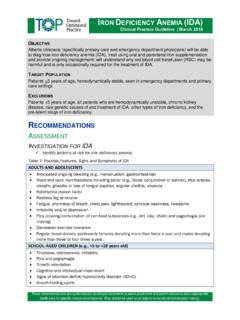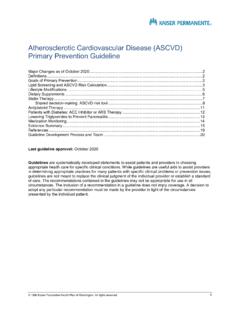Transcription of Chronic Kidney Disease in the United States, 2019
1 277382-CMarch 05, 2019 With Chronic Kidney Disease (CKD), kidneys become damaged over time or cannot clean the blood as well as healthy kidneys. When the kidneys don t work well, wastes and extra water build up in the body and may cause other health problems, including heart Disease and high blood pressure. However, people with CKD and people at risk for CKD can take steps to protect their kidneys. CKD Is Common Among US AdultsKeep kidneys healthy by managing blood sugar and blood pressure.*Percentage of CKD stages 1 4 among US adults aged 18 years or older using data from the 2013 2016 National Health and Nutrition Examination Survey and the CKD Epidemiology Collaboration (CKD-EPI) equation. These estimates were based on a single measure of albuminuria or serum creatinine; they do not account for persistence of albuminuria or creatinine as indicated by the Kidney Disease Improving Global Outcomes recommendations.
2 Thus, CKD in this report might be overestimated. Estimates by sex and race/ethnicity were age-standardized using the 2000 US census population; the overall percentage is unadjusted. The number of adults with CKD stages 1 4 was estimated by applying the overall percentage to the 2016 US Census Stats 15% of US adults 37 million people are estimated to have CKD.* Most (9 in 10) adults with CKD do not know they have it. 1 in 2 people with very low Kidney function who are not on dialysis do not know they have CKD. CKD is more common in people aged 65 years or older (38%) than in people aged 45 64 years (13%) or 18 44 years (7%). CKD is more common in women (15%) than men (12%). CKD is more common in non-Hispanic blacks (16%) than in non-Hispanic whites (13%) or non-Hispanic Asians (12%).
3 About 14% of Hispanics have and high blood pressure are the major causes of CKD in adults. Other risk factors include heart Disease , obesity, a family history of CKD, past damage to the kidneys, and older to current estimates:* Chronic Kidney Disease in the United States, 2019 CKD Risk Factors0510152025303540 HispanicsNon-Hispanic AsiansNon-Hispanic blacksNon-Hispanic whitesWomenMen65+45-6418-44 PercentagePercentage* of CKD Among US Adults 18 Years or Older,By Age, Sex, and Race/EthnicityCKD-Related Health Problems Control risk factors for CKD: o High blood pressure. o High blood sugar levels. Keeping a healthy body weight through a balanced diet and physical activity may help. Test for CKD regularly in people who have diabetes, high blood pressure, or other risk factors for Disease and Stroke Having CKD increases the chances of also having heart Disease and stroke.
4 Managing high blood pressure, blood sugar, and cholesterol levels all factors that increase the risk for heart Disease and stroke is very important for people with CKD. Anemia or low red blood cell count (can cause fatigue and weakness). Low calcium levels and high phosphorus levels in the blood (can cause bone problems). High potassium levels in the blood (can cause an irregular or abnormal heartbeat). Loss of appetite or nausea. Extra fluid in the body (can cause high blood pressure, swelling in the legs, or shortness of breath). Infections or a weakened immune system. Depression. Kidney Failure If Kidney damage is severe and Kidney function is very low, dialysis or a Kidney transplant is needed for survival.
5 Kidney failure treated with dialysis or a Kidney transplant is called end-stage Kidney Disease (ESKD). Treatment may slow the decline in Kidney function and delay Kidney failure. However, not everyone with CKD develops ESKD, and in some cases ESKD develops even with treatment. Facts About ESKD In 2016, nearly 125,000 people in the United States started treatment for ESKD, and more than 726,000 (2 in every 1,000 people) were on dialysis or were living with a Kidney transplant. Every day, more than 240 people on dialysis die. For every 2 women who develop ESKD, 3 men develop ESKD. African Americans are about 3 times more likely than whites to develop ESKD. For every 3 non-Hispanics who develop ESKD, 4 Hispanics develop ESKD.
6 In US adults aged 18 years or older, diabetes and high blood pressure are the main reported causes of ESKD. In US children and adolescents younger than 18 years, polycystic Kidney Disease and glomerulonephritis (inflammation of the kidneys) are the main causes of ESKD. Reported Causes of End-stage Kidney Diseasein the United StatesN=726,331 (all ages, 2016) Source: US Renal Data Sytem *Includes polycystic Kidney Disease , among other 05, 2019 Early DeathAdults with CKD are at a higher risk of early death compared to adults without CKD of the same age. Other Health ProblemsAs CKD worsens over time related health problems become more likely, including:Ways to Prevent CKD or Detect It Early Testing and Treatment People may not feel ill or notice any symptoms until CKD is advanced.
7 The only way to find out if people have CKD is through simple blood and urine tests. The blood test checks for creatinine (a waste product produced by muscles) in the blood to see how well the kidneys work. The urine test checks for protein in the urine (a sign of Kidney damage). Following a healthy diet and taking medicine for diabetes and high blood pressure may keep CKD from getting worse and may prevent other health problems such as heart blood pressureGlomerulonephritisOther causeUnknown cause People With CKD Can Lower Their Risk for Kidney Failure Learn about CKD from their Kidney doctor (nephrologist) to better understand treatment and protect their kidneys. People with nephritis, polycystic Kidney Disease (a cause of CKD and Kidney failure), or other Kidney Disease should talk about specific treatment options with their Kidney doctor.
8 Manage blood sugar and blood pressure. Manage CKD: o Make lifestyle changes ( , healthy eating, exercise) to prevent more Kidney damage. Meet with a dietitian to create a Kidney -healthy eating plan that is low in salt and fat and has the right amount of protein. As CKD gets worse, the plan may also include limiting phosphorus and potassium. o Use medicines ( , drugs to lower blood pressure) to slow the decline in Kidney function. o Stop smoking. o Avoid conditions or exposures that can harm the kidneys or cause Kidney function to suddenly get worse: Certain medicines: Over-the-counter pain medicines like ibuprofen and naproxen. Some antibiotics. Proton pump inhibitors used to reduce stomach acid, such as omeprazole and lansoprazole.
9 Herbal supplements (always talk to a doctor before taking any supplements). Certain dyes (contrast agents) used to make blood vessels or organs visible on X-rays or other imaging tests. Kidney infections (preventing bladder infections may help). Check with a doctor about other things to with diabetes, high blood pressure, or CKD should talk to their doctor about how to protect their 05, 2019277382-CMarch 05, 20197. Go AS, Chertow GM, Fan D, McCulloch CE, Hsu CY. Chronic Kidney Disease and the risks of death, cardiovascular events, and hospitalization. N Engl J Med. 2004;351(13):1296 Yarnoff BO, Hoerger TJ, Shrestha SS, et al. Modeling the impact of obesity on the lifetime risk of Chronic Kidney Disease in the United States using updated estimates of GFR progression from the CRIC study.
10 PLoS One. 2018 ;13(10):e0205530. 9. Perlman RL, Finkelstein FO, Liu L, et al. Quality of life in Chronic Kidney Disease (CKD): a cross-sectional analysis in the Renal Research Institute-CKD study. Am J Kidney Dis. 2005;45(4):658 Kinchen KS, Sadler J, Fink N, et al. The timing of specialist evaluation in Chronic Kidney Disease and mortality. Ann Intern Med. 2002;137(6):479 486. 12. Snyder JJ, Collins AJ. Association of preventive health care with atherosclerotic heart Disease and mortality in CKD. J Am Soc Nephrol. 2009;20(7):1614 1622. 13. Hoerger TJ, Wittenborn JS, Segel JE, et al. A health policy model of CKD: 2. The cost-effectiveness of microalbuminuria screening. Am J Kidney Dis. 2010;55(3):463 473. 14. National Institutes of Health.
